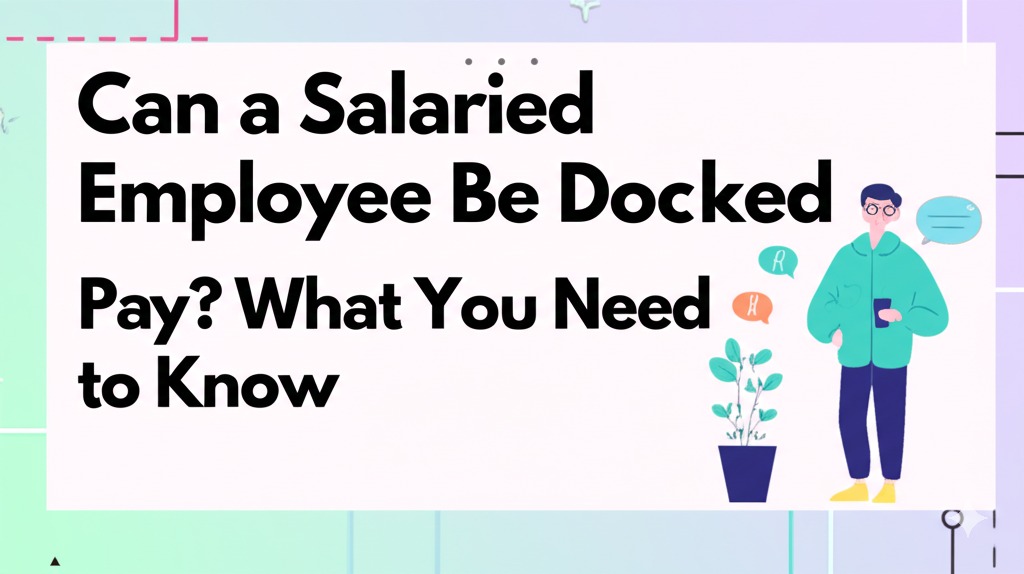
If you’re a salaried employee, you might assume your paycheck is guaranteed no matter what. But is that really the case? Can a salaried employee be docked pay, and if so, under what circumstances? Whether you’re an employee trying to understand your rights or an employer navigating wage laws, it’s important to know the legal rules behind salary deductions.
This article breaks it all down—from what “salaried” really means to when deductions are actually legal. Read on to avoid costly mistakes or unexpected pay cuts.
What Does It Mean to Be a Salaried Employee?
Before diving into deductions, it’s important to clarify what “salaried” means.
Salaried employees are typically paid a fixed amount per pay period, regardless of the number of hours worked. This is different from hourly workers, who are paid based on actual hours worked. Salaried positions are often exempt from overtime pay under the Fair Labor Standards Act (FLSA).
Key Characteristics of Salaried Employees:
- Earn a predetermined amount of money each week
- Generally receive the same pay regardless of hours worked
- Often fall under exempt classifications like executive, professional, or administrative
But this fixed pay doesn’t mean it can never be reduced.
Is It Ever Legal to Dock a Salaried Employee’s Pay?
Yes, under certain conditions, an employer can legally deduct pay from a salaried employee—but only in specific situations defined by law.
When Deductions Are Permissible:
According to the U.S. Department of Labor, these are acceptable reasons for docking a salaried employee’s pay:
- Full-day absences for personal reasons (not illness or disability)
- Full-day absences due to illness or injury if the employer offers a bona fide sick leave plan
- Disciplinary suspensions for violations of workplace conduct rules (e.g., harassment, substance abuse)
- Unpaid leave taken under the Family and Medical Leave Act (FMLA)
- Initial or final week of employment if the employee does not work the full week
- To offset jury duty, witness fees, or military pay if the employee still receives full salary
📝 Note: Partial-day deductions are generally not allowed unless the employee is on FMLA leave.
When Docking Pay Is Not Allowed
The FLSA protects salaried employees from improper deductions that would threaten their “exempt” status. Making unauthorized deductions can result in losing the exemption, meaning the employee would be eligible for overtime pay.
Examples of Improper Deductions:
- Taking pay away for arriving late or leaving early
- Docking pay for partial-day absences not covered by FMLA
- Reducing salary for lack of work or slow business
- Deductions for minor disciplinary infractions (like dress code violations)
👉 Important: Even well-meaning employers can violate FLSA rules if they don’t fully understand them.
How Much Can Be Deducted?
When a deduction is legal, how much can an employer take?
- For full-day absences, the deduction can equal the day’s worth of pay.
- For disciplinary suspensions, the deduction must reflect the exact suspension period.
- In cases like jury duty or military leave, employers may subtract what the employee was paid by the other entity (e.g., court or government).
⚖️ Best Practice: Employers should have clear policies in place and keep detailed records to ensure deductions are lawful and consistent.
What Happens If an Employer Makes an Improper Deduction?
Making unauthorized pay deductions can lead to serious consequences.
Potential Outcomes:
- The employee’s exempt status may be revoked
- The employer may owe back pay, including overtime
- Legal action or penalties may be imposed by the Department of Labor
Employers can protect themselves by implementing a safe harbor policy, which allows employees to report improper deductions so that they can be corrected.
What Employees Should Do If Pay Is Docked
If you’re a salaried worker and notice a deduction that seems questionable, here’s what to do:
- Review your pay stub and employment agreement
- Ask your HR department for clarification
- Document everything—dates, amounts, reasons given
- File a complaint with the Department of Labor if necessary
💬 Tip: Open communication can often resolve the issue without escalation.
Tips for Employers: Stay Compliant with FLSA Rules
To avoid fines or lawsuits, employers should:
- Clearly classify employees as exempt or non-exempt
- Train payroll and HR teams on FLSA deduction rules
- Maintain transparent policies on pay and disciplinary procedures
- Offer a safe harbor complaint process for employees
Conclusion: Know Your Rights and Responsibilities
So, can a salaried employee be docked pay? The answer is yes—but only under specific legal circumstances. Both employees and employers should understand the rules surrounding salary deductions to avoid costly mistakes.
If you’re unsure whether a deduction is legal, it’s always wise to consult a labor law expert or the Department of Labor.

Andre Cuevas provides career insights, job search strategies, and professional advice to help individuals navigate the job market and achieve their career goals.





